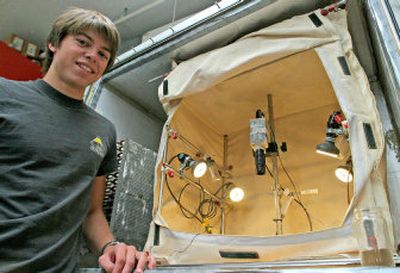The sky’s no limit for teenage scientist

What are the odds of a teenager winning $10,000 and being the brains behind an experiment that’s been incorporated into two space missions?
Ask Lucas Moller. At 17, he’s done both.
The Moscow, Idaho, resident recently secured a $10,000 scholarship from the Davidson Institute for Talent Development for his scientific work on Martian dust. He is one of 17 young people nationwide to attain the fellowship from the institute, which recognizes prodigies in different fields.
Moller captured the institute’s attention with a science project he called, “Static and Dynamic Analysis of Mars Dust: Application to Mars Exploration.”
It all started six years ago when he was in fifth grade; he entered and won a NASA/Jet Propulsion Laboratory and Planetary Society competition that challenged children to create an experiment that would be included on a Mars mission.
“I was interested in space already,” Moller said. “It just turned out to be a whole big thing, and it just kept evolving.”
He has been studying Martian dust ever since. Moller said he examines the properties of dust particles to determine the angle at which the particles start to slide off a surface, or the “angle of repose.” That might aid in finding the most effective design for Mars exploration and support systems to reduce dust accumulation. That’s important on Mars, where dust storms are common, because dust buildup can interfere with performance and affect the longevity of devices such as solar panels, according to Moller’s research Web site.
Moller has surrendered himself to the project, writing scientific papers, attending conferences, laboring through the summer and whenever he can squeeze in time during the school year.
“It’s a part of my life,” he said.
The study was incorporated into a 2001 NASA Mars mission that was canceled after another lander crashed, Moller said. It was then taken up in a European Space Agency’s mission; that lander hurtled into Mars in 2003. Even though it crashed, it was still a personal accomplishment to have his study on board, Moller said.
He is still refining his project at the University of Idaho with Markus Tuller, an assistant professor of environmental physics.
“I was so impressed with his knowledge and his ideas, and I basically offered him an opportunity to work in my lab,” Tuller said. “His understanding of science is really amazing … his skills are almost better developed than most graduate students.”
At the university, Moller said he has been experimenting with Martian dust simulants, explaining that different variables influence the angle of repose.
“The surface that the dust is settling on and the dust’s properties will determine the angle,” he said.
Moller and Tuller jointly applied for a $40,000 grant to fund their studies, which they hope to finalize and publish soon.
“It’s not much money when you talk about what we’re doing,” Moller said. “We’re trying to simulate the Mars environment on Earth.”
Kimberly Kuhlman, of NASA’s Jet Propulsion Laboratory and a research scientist at the Planetary Science Institute, has been one of Moller’s mentors.
“Luke is definitely a self-starter,” Kuhlman said. “He has a lot of stick to it-iveness.”
Kuhlman encouraged Moller to pursue different opportunities such as the annual Lunar and Planetary Science Conference in the Houston area. “It’s a major scientific conference, not for high school students,” she said.
Moller has participated at the conference four times.
Yet Moller, who will be a senior at Moscow High School, avoids calling himself a child genius. He said he has a life like many other teenagers, and he takes the same kinds of classes.
“I still learn some things in science,” he said. “I guess science comes easier for me.”
Like some of his friends, he’s taken college-level Spanish classes at the university and is a few credits short of getting a minor. Moller also runs track in the fall and spring.
And he likes to plays games on his Xbox and listen to music. “I listen to everything,” he said. “I have a full iPod.”
Moller said he believes that with the encouragement of those around him, he’s been afforded a great opportunity to cultivate his gift.
He said he’s pleased to see his efforts getting results: “It’s great to have something come out in the end.”